After what felt like a millennium, in January schools reopened in Cambodia, and parents hoped it would usher in some level of normality. Unfortunately, 2021 isn’t panning out the way we hoped it would, and schools are closed again in the wake of the “February 20th incident.” So how can we survive another round of school closures and online learning? As a mother, teacher, and previous mental health counselor, here are some ideas that may help ease some of the tension in your household, and even see some positives in this unprecedented situation.
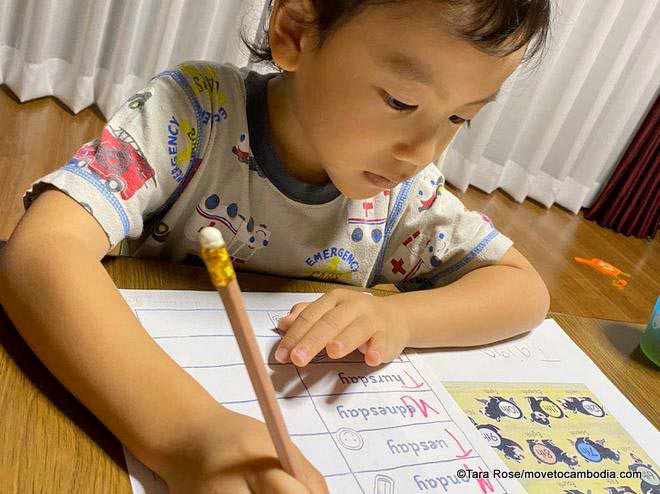
School closures don’t have to be a negative situation. Read on for tips on how to get through it.
Follow a regular schedule
In order to help the transition from school to home learning (and back again) it’s a wise idea to try to keep the same routine during at home study that you would on a normal school day. That means trying to follow a daily timetable — consistently waking the children up at the same time you usually would for school, have normal meal times, and complete homework or house chores at designated times. Of course this may not be easy, especially if you are also juggling working from home, or if the responsibility is in the hands of a nanny or relative, but it will also mean fewer tantrums, better learning outcomes, and less stress in the long run.
Depending on the age of your child, a sample day may look like this:
7 – 8 a.m. Wake up; shower; breakfast
8 – 9 a.m. Warm up with some morning exercise (more about this later)
9:30 – 11:30 a.m. Follow the learning program your school has provided. If there is no specific timetable or online lesson, I recommend taking a break between each task and supplementing it with an age appropriate chore around the house (explained in more detail below)
11:30 a.m. – 1:30 p.m. Lunch; free play; nap for younger children
1:30 – 3 p.m. Complete your school’s online learning program
3 – 3:30 p.m. Snack; story time
3:30 p.m. Follow your usual daily routine
Don’t forget regular healthy snacks and water breaks!
While it may seem rigid, routine and consistency in a child’s life helps them to feel safe, as unpredictability can cause anxiety and stress. In a pandemic situation where things can feel very scary for your child, putting effort into maintaining a balanced and consistent program will help them control their emotions and help save your sanity.
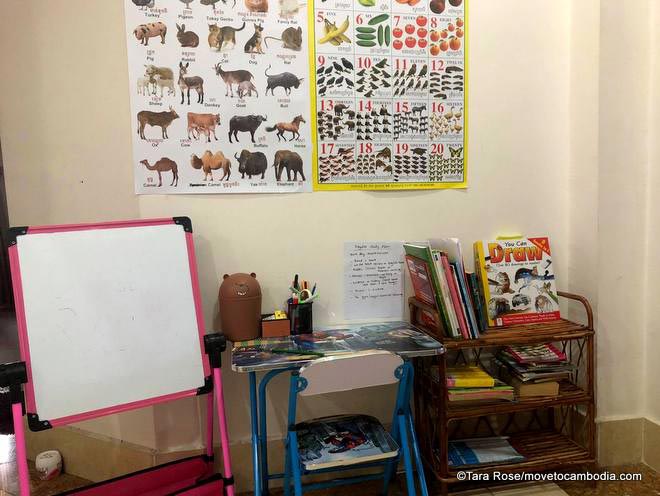
Consider setting up a quiet study area for your child.
Actively participating in at home or online classes
We are all aware of the negative effects of too much screen time, however allowing and assisting your child in joining online classes is very important for many reasons. Isolation can cause stress in children, and by regularly seeing their classmates and teachers on screen, children are less likely to suffer from anxiety.
You should be able to trust the teachers have your child’s best interests at heart and have prepared well-rounded study-at-home packs containing arts and crafts projects, workbooks or worksheets, fun things to do at home and a complementary online (video) program.
Usually in a classroom, the teacher will notice if a child has developed a love for a particular topic and expand on it, but that may not be as noticeable if that child is at home. An idea to supplement the school materials, while also acting as a great way to help overcome feelings of isolation, is virtual tours. There are countless videos of virtual tours and field trips, including museums, farms, chocolate factories, and even zoo tours, including live camera feeds from the enclosures.
While it may seem that all the responsibility has fallen on the parents and teachers are getting a nice break, in fact teachers are working harder than ever, having to suddenly adapt to a new mode of teaching and using new technology skills. Open and honest communication between parents and teachers is the key, we are all human and navigating this unwanted situation together.
Rest assured, while younger children may need more assistance from their parents, you will be surprised how resilient children are. As a teacher I have seen first-hand the difference in students who maintained even a small level of contact with their teachers and classmates online compared with those who withdrew from study completely.
To help motivate your child, setting up their own quiet study area can be very helpful, and doesn’t need to be expensive. If you can’t convert your dining table into a makeshift desk, there are dozens of online shops that sell child size desks, whiteboards and chairs at good prices, including The Kids Brathna and MINISO Cambodia.
And if you still can’t motivate your child, or if they are just not suited to online study, don’t be too hard on yourself. It may just be worth investing in a short term tutor to help offer some guidance so your child doesn’t fall too far behind and lose confidence.
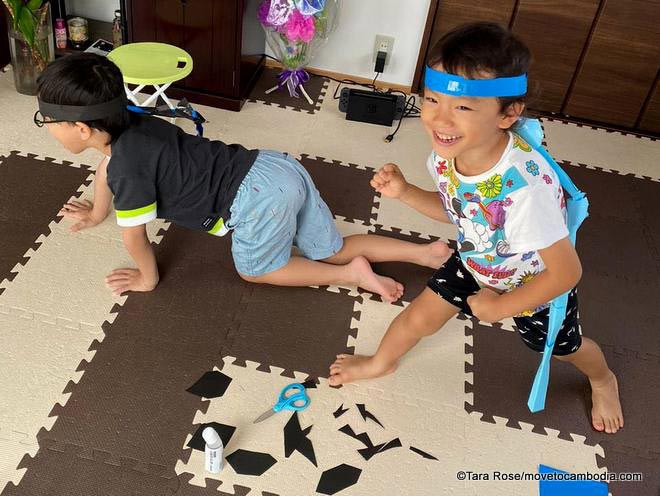
Arts and crafts are a great at-home pandemic activity.
Arm yourself with books, art materials, and educational games
While it used to be difficult to find a good variety of affordable children’s books, arts and craft supplies and educational games in Cambodia, recently a number of online shops and new stores have opened up, with the majority offering delivery. When all else fails, I’ve found that having a variety of books (story books, science books, how-to books, coloring books) or games can be a lifesaver when you or your child are at your wits end.
Some of my favorite stores include:
English Books Club (online store). This lovely small business offers a variety of second-hand early readers, story books, picture books, pop-up books and resource books, delivered straight to your door. Prices start from just $1.50, and communication is easy via Facebook Messenger. While the store is technically online, the lovely Minh will allow you to come to her home to have a browse if you call her beforehand at +855 (0)69 225 888
Maisy Bookshop & Gifts is aimed at children up to 14 years old, and is particularly good for boxed sets, including favorites such as Elmer, Curious George, National Geographic, Lord of the Rings, Treehouse Series, Marvel Comics and Early Readers and Phonics, as well as a nice collection of wooden toys and hands on learning activities. They offer free delivery within Phnom Penh for orders from $50.
Make It is a great little arts and crafts supply store that offers superb customer service, a good selection of materials that are not easy to find in Cambodia, and also hosts workshops when Covid isn’t wreaking havoc.
You can also check out my recently blog post on where to buy English-language children’s book in Cambodia.
Turn everyday activities into learning opportunities
It’s not all bad having our children at home with us. While not everyone may feel like a natural teacher, as a parent we are an important role model with so much wisdom (really!) to share with our little ones, and learning can be built into everyday life if we become more conscious of it.
As I mentioned in my suggested timetable, even seemingly boring chores can play a role in learning. A chore doesn’t have to look like a chore if you make it fun for your child, and with a bit of creativity you can take things one step further and turn the chore into a learning opportunity. Explaining the science of germs while they wipe down a benchtop, folding clothes, and putting them away in color categories, talking about nutrition while they peel vegetables, repacking the kitchen cupboard in size/shape order, learning about time by using a timer to see how long it takes to complete a job are just some examples, and the possibilities are endless if you use your imagination!
Keep active and healthy together
This means not just physically, but mentally. As I’ve mentioned, this is an unprecedented situation we’ve all found ourselves in, one we could never have imagined or prepared for, so we need to also go easy on ourselves. It’s inevitable that feelings like resentment, boredom, loneliness and even fear are going to creep in, especially since options for visiting our home countries are extremely limited, and while we chose Cambodia as our home, it can still be hard to know that we can’t just jump on a plane as before. So we really need to look after ourselves – and each other. Try to keep in touch with friends and family online as much as possible to avoid the effects of isolation becoming too much. Online you can find many mental health resources if things start to feel overwhelming.
Next, food! I feel like I’ve never spent so much on food as I have during school closures. Yet it’s important to ensure you and your child try to eat a balanced diet, drink plenty of water and try to keep as active as possible. During community outbreaks of COVID-19, we are advised not to leave the house except in an emergency, but this isn’t an excuse to let our health slide.
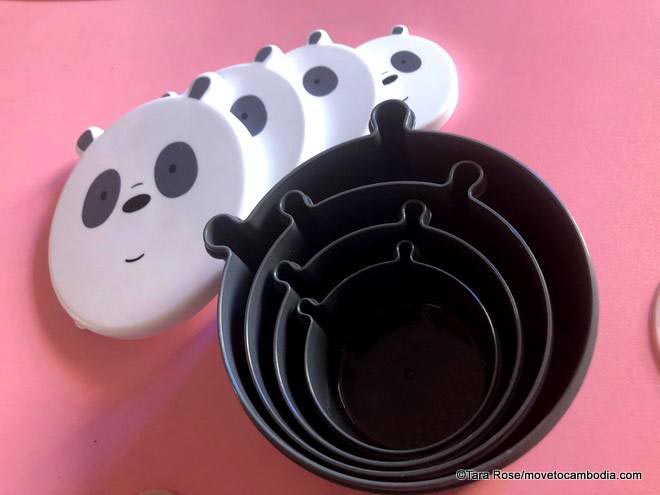
We Bare Bear lunch boxes are a great way to offer snacks to graze on during the day.
If your child is eating you out of house and home, or constantly nagging you for snacks, a great tip is to prepare a nutritious snack box for them with all the snacks for the day, and allow them to pick at them outside of mealtimes so they are not opening and closing the fridge or asking for unhealthy treats as much. I found that putting fresh fruit, cheese, seeds and nuts into a cute nested set of We Bare Bear lunch boxes ($4.50) from Miniso worked a charm. With plenty of options for grocery and meal deliveries now, keeping your family fed is less time consuming than before (well, maybe).
On to exercise! This is where Youtube is actually your friend. Once your child gets tired of you acting like their drill sergeant, demanding squats, sit-ups, lunges and star jumps, I give you permission to hand the responsibility over to the dreaded screen for a little while.
One of my favorite Youtube channels is Cosmic Kids Yoga, which I adore for a number of reasons. It’s yoga for kids (but parents can join in too) with different themes to entice even the most reluctant child. The biggest plus is its underlying theme is about reducing anxiety, and teaching children important morals and resilience. Between you and me, I’ve been known to pull out my yoga mat and follow a few of the Zen Den videos myself.
Some other favorites include The Learning Station Brain Breaks, Jack Hartmann and if your kids like things a bit silly, try Steve Steve.
Hopefully I’ve helped ease some of your guilt and provided some useful information to help you during this time. With no idea how long school closures will last for, let’s prioritize taking care of ourselves, looking out for other parents and families, and trying our best to lessen the negative effects by positively focusing on what we can control.




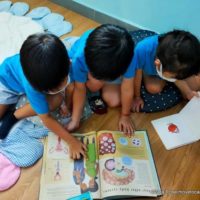
You are amazing
I am not a specialist in child development, but this strikes me as a very thoughtful, professional guide to pandemic survival in a home with little ones. Well done!